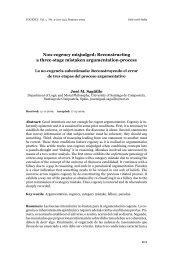Cogency v2 n2
Cogency v2 n2
Cogency v2 n2
You also want an ePaper? Increase the reach of your titles
YUMPU automatically turns print PDFs into web optimized ePapers that Google loves.
COGENCY Vol. 2, N0. 2, Spring 2010<br />
In this case, we would only lack a given assignment of truth-values, not<br />
standards to appraise the argument. (p. 82)<br />
In the first quote, the field (and the audience) seems to play an important<br />
role in the appraisal, but in the second quote its importance is denied.<br />
Normally, however, the lack of truth values is a real problem for appraising<br />
the epistemic value of arguments. On the one hand, the impression that the<br />
field provides the truth-values is given, but on the other hand, it is also<br />
suggested that we are able to determine them without the field. Alas, how<br />
do we determine the truth values if we do lack them?<br />
Another problematic aspect is that on p. 80 she asks<br />
[w]hy do we need justification for our inferences? The obvious answer is<br />
that we need it in case they are challenged, and this answer is perfectly<br />
sound. By contrast, the idea that good arguments need justified inferences<br />
is a holdover from deductivism.<br />
And later on that same page she states:<br />
Yet, the truth is that, in order to justify our claims, we do not need our<br />
inference claims to be necessary, or justified. We just need them to be<br />
true, or highly plausible. The inference claim enables us to pass from<br />
reason to claim; if it is true, or highly plausible, the claim will be justified<br />
because of the reason. Second-level justification may be desirable in certain<br />
cases, but it does not prevent us from falsity. (Ibid.)<br />
In the first quote, it appears that deductivism and epistemological<br />
internalism 2 (called ‘second-level justification’) are somehow taken to go<br />
together (although they do not) and then rejected. Moreover, it appears that<br />
epistemological externalism – the remaining choice, given the rejection of<br />
internalism – is clearly not acceptable, since it is required that we need to<br />
2<br />
Epistemological internalism is the doctrine that whether an epistemic agent is justified<br />
in believing, for example, the result of an inference, supervenes on factors one is in a<br />
position to know by reflection alone. A stronger form on internalism, called access<br />
internalism, holds that one has some special access to the justifying features. See e.g. James<br />
Pryor (2001) for discussion<br />
160








